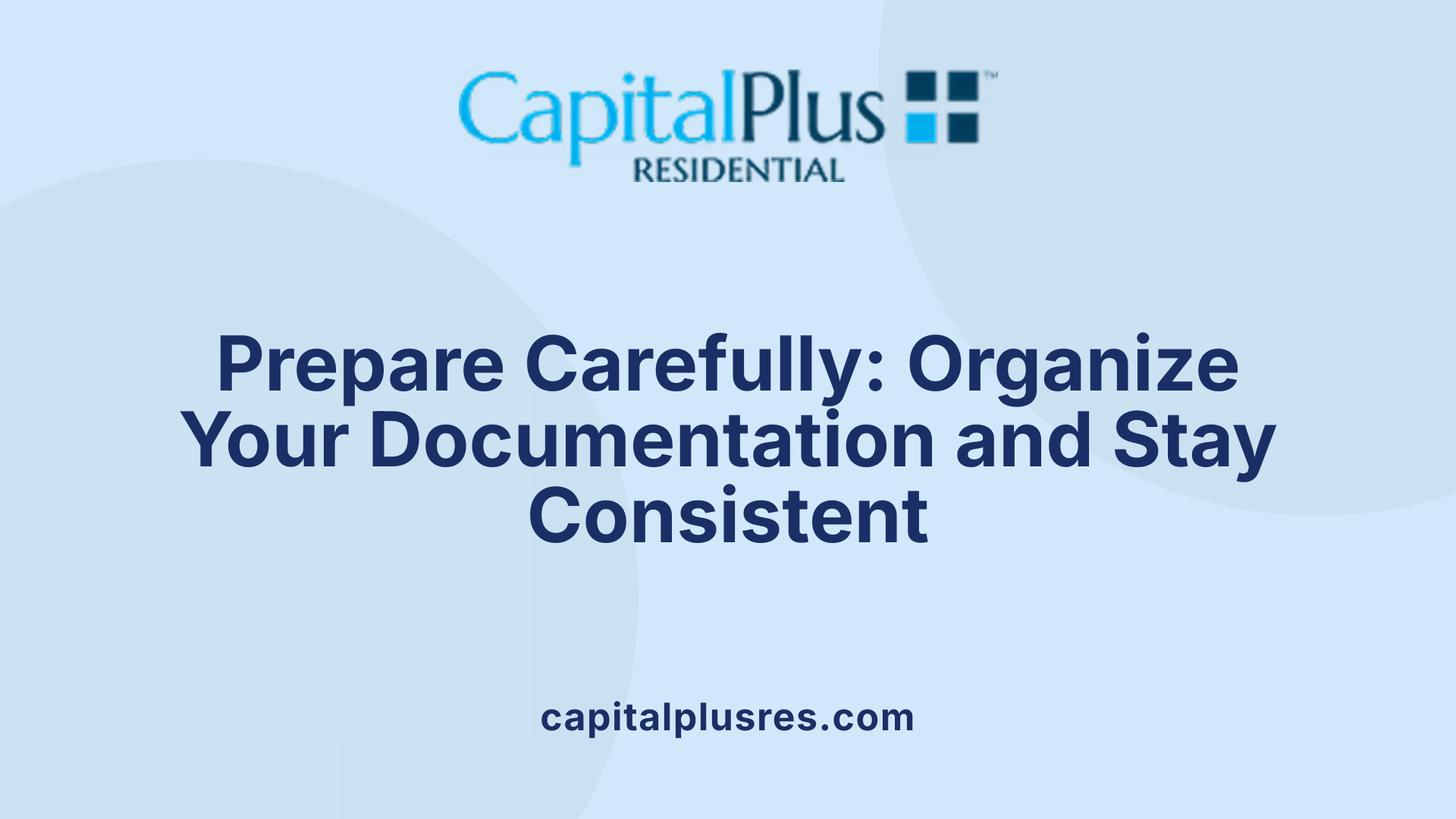Understanding the Path to Mortgage Approval
Navigating the mortgage approval process can be complex and fraught with potential pitfalls. While financial stability and good credit are essential, there are specific behaviors and decisions that can significantly lower your chances of approval. This article highlights common mistakes to avoid, ensuring you remain on a smooth path toward homeownership.
Financial Changes During the Mortgage Process

What are common mistakes to avoid during the mortgage application process?
During the mortgage process, there are several common pitfalls that can delay or jeopardize your approval. One of the most critical errors is making large purchases without proper planning, such as buying furniture or appliances, which can unexpectedly increase your debt-to-income ratio and impact your loan qualification. Similarly, opening new lines of credit, including credit cards or personal loans, can lower your credit score and increase your debt load, both of which are red flags to lenders.
Transferring funds between accounts without documentation can also raise suspicions. Lenders want to verify the source of your down payment and reserves, and unaccounted-for deposits may lead to delays or re-evaluation of your financial stability.
Another significant mistake is changing jobs or quitting your employment before closing. Lenders verify employment status to confirm income stability, and any job change without proper communication can cause delays or disqualification.
Securing pre-approval before you start house hunting is essential—without it, you risk losing time or falling in love with homes outside your budget. It also demonstrates your seriousness as a buyer, making your offers more attractive.
Maintaining a consistent financial profile, including timely bill payments and careful management of credit, increases your chances of approval. Not regularly checking your credit report or ignoring errors can also negatively impact your score, so staying informed is crucial.
Being cautious with your financial activities during this sensitive period is vital for a smooth approval process.
Impact of Debt and Credit Management

What actions could negatively impact my chances of getting a mortgage approved?
Several financial behaviors can reduce your chances of securing a mortgage. Applying for new credit cards, making large purchases like furniture or appliances, or taking out new loans just before submitting your application can significantly increase your debt-to-income ratio. This makes lenders cautious because it suggests higher monthly obligations. Missing payments on existing debts or bills can harm your credit score and signal financial instability.
Having a history of bankruptcies, delinquencies, or collections also weighs against approval. Additionally, an excessively high debt-to-income ratio—above 36-43%—can lead to rejection, as lenders see it as a risky investment.
Inconsistent employment history or changing jobs shortly before applying can raise red flags, as consistent income indicates reliability. Providing incomplete or suspicious documentation, like large deposits without proper explanation, can further jeopardize your application.
Overall, actions that increase debt or introduce financial uncertainty during the mortgage process should be avoided to improve your chances of approval.
How does credit score affect my mortgage approval?
Your credit score plays a major role in whether you qualify for a mortgage and the interest rate you’ll receive. Higher scores, typically above 620, increase approval odds and can lead to better terms. For federally backed loans, scores below this threshold might still qualify but often require larger down payments.
A strong credit history, with on-time bill payments and low credit utilization, shows lenders your reliability as a borrower. Conversely, a low score or a record of missed payments, collections, or delinquencies diminishes your chances of approval.
To optimize your credit profile, review your credit report regularly for errors, keep your credit utilization below 30%, and avoid late payments. Improving your score can make the difference between approval and rejection.
Why is employment stability important for mortgage approval?
Lenders highly value stable employment because it indicates steady income and reduces perceived risk. Providing verification through pay stubs, tax returns, and employer confirmation reassures lenders that you can meet your mortgage commitments.
Frequent job changes or quitting your job before closing can signal financial volatility, potentially leading to denial. If you switch jobs during the approval process, ensure the new employment provides similar or higher income and is properly documented.
Generally, lenders prefer at least two years of consistent employment in the same field or with the same employer. Employment stability minimizes concerns about sudden income loss, fostering confidence in your ability to repay the loan.
What role does debt-to-income ratio play in mortgage eligibility?
The debt-to-income ratio compares your monthly debt payments to your gross monthly income. It’s a critical metric lenders use to judge your ability to manage mortgage payments along with existing debts.
A DTI below 36% is considered favorable, indicating manageable debt levels. If your DTI exceeds this, especially above 43%, your approval chances diminish because lenders worry about your capacity to handle additional debt.
Managing your debts—by paying off existing loans, avoiding new ones, and keeping your monthly obligations low—helps keep your DTI within acceptable limits. This not only boosts your approval prospects but can also qualify you for better interest rates.
| Aspect | Recommended Range | Impact on Mortgage Approval | Additional Notes |
|---|---|---|---|
| Credit Score | 620 or higher | Increased approval chances | Higher scores lead to better rates |
| Debt-to-Income Ratio | Below 36% | Better approval odds | Lower ratios reduce lender risk |
| Employment Stability | 2+ years in the same field | Demonstrates reliability | Frequent job changes can be risky |
| Credit Utilization | Below 30% | Improves credit score | Excessive utilization can lower score |
Remaining attentive to your financial habits, maintaining steady employment, and reviewing your credit report proactively can significantly influence your ability to obtain a mortgage successfully.
Proper Documentation and Financial Transparency

What errors should I avoid after receiving mortgage pre-approval?
After obtaining mortgage pre-approval, it is vital to maintain stability and transparency in your financial activities. Major mistakes to avoid include making large deposits or financial transactions without proper documentation. These can trigger red flags during the underwriting process, causing delays or even denial of your loan. You should never change your employment status, such as switching jobs or quitting without informing your lender, as employment verification is conducted before closing.
Similarly, refrain from applying for new lines of credit, credit cards, or loans, and avoid making significant purchases on credit or cash. Such actions can increase your debt-to-income ratio and lower your credit score, reducing your chances of approval. It's equally important to keep existing credit accounts open and in good standing, avoiding excessive debt repayment or closing accounts prematurely.
Overall, stay consistent with your personal and financial details, pay all bills on time, and follow your lender’s instructions carefully. These prudent steps help ensure a smooth final approval process and prevent surprises that could jeopardize your mortgage.
How do undocumented deposits affect mortgage approval?
Undocumented deposits are a common issue that can seriously delay or jeopardize your mortgage approval. Lenders require a clear trail of where your funds originate to assess your financial stability accurately. Large deposits that lack proper documentation—such as bank statements, gift letters, or receipts—raise suspicion and invite further scrutiny.
If the source of the deposit isn’t well-documented, underwriters may question whether funds are legitimate or if they are part of unreported income or illicit sources. This can lead to delays as additional verification is requested, or result in outright denial if the source remains unverified.
To avoid this problem, always keep documentation for all deposits. This includes paychecks, sale proceeds, gift letters from relatives, or savings transfers. Providing transparent and well-supported financial records enables lenders to verify your financial health and speeds up the approval process.
Why is employment verification critical during mortgage approval?
Employment verification is a cornerstone of mortgage approval because it ensures that your income is stable and reliable. Lenders typically verify your employment status through pay stubs, tax returns, and direct confirmation with your employer.
If you change jobs during the process, especially close to the final approval, it can cause delays or rejection. Even a short employment gap or unstable employment history raises concerns about your ability to repay the loan.
Therefore, maintaining your current employment until after closing is advised, and any employment changes should be communicated immediately to your lender. This way, your income verification remains accurate, and your application stays on track.
What role does paying bills on time play in mortgage approval?
Consistently paying bills on time plays a crucial role in maintaining a positive credit profile. Missed payments, late fees, or defaulted obligations can lower your credit scores and signal to lenders that you might be a risky borrower.
A good history of punctual bill payments demonstrates financial responsibility and reliability—traits that lenders highly value. To keep your profile healthy, set up automatic payments for utility bills, credit cards, and other obligations.
Failing to pay bills on time can not only decrease your credit score but also reduce your reserves and overall borrowing capacity. During the mortgage process, staying current on all payments is essential to strengthen your application.
How important is documenting the source of your down payment?
Documenting the source of your down payment is critical because lenders want to verify that your funds are legitimate and readily accessible. Whether your down payment is from savings, sale of an asset, or gift funds, you must provide appropriate proof.
For savings or sale proceeds, this involves bank statements or sale receipts that clearly show the transfer or collection of funds. If you receive a gift, a gift letter specifying that the money is a gift and not a loan is necessary, along with corresponding bank statements.
Failure to properly document the source of your down payment can create suspicion about your financial integrity, leading to delays or rejection. Proper documentation reassures lenders of your financial stability and commitment, easing the path toward closing.
| Aspect | What to Do | Why It Matters |
|---|---|---|
| Avoid large undocumented deposits | Keep receipts and bank statements for all deposits | Prevents suspicion and delays in approval |
| Maintain employment stability | Inform your lender of any changes | Ensures accurate income verification |
| Pay all bills on time | Set up automatic payments | Preserves your credit score and profile |
| Document down payment funds | Save and organize bank statements and gift letters | Demonstrates financial legitimacy |
These practices collectively support a transparent and trustworthy financial profile during your mortgage journey, significantly increasing your chances of approval.
Understanding Loan Options and Costs

What options are available for those with limited savings or lower credit scores?
For individuals with limited savings or lower credit scores, government-backed loan programs like FHA, VA, USDA, HomeReady, and Home Possible provide accessible pathways to homeownership. These programs typically require smaller or zero down payments and have more flexible credit requirements compared to conventional loans.
FHA loans, for example, accept credit scores as low as 580 with a down payment of just 3.5%. VA loans are available to eligible veterans and active service members, often requiring no down payment at all. USDA loans facilitate home buying in rural areas and sometimes require no down payment, with lenient credit standards.
These options can significantly reduce barriers to buying a home. It’s important to compare different programs, understand their specific costs, and work with qualified lenders who are experienced with these government-backed schemes.
How can understanding closing costs improve your mortgage experience?
Being aware of closing costs, which typically range from 2% to 5% of the home's purchase price, helps you plan your finances better. These costs include various fees such as appraisal fees, loan origination charges, title services, taxes, and insurance.
Knowing these expenses in advance allows you to save appropriately and avoid surprises at the closing table. Additionally, understanding closing costs enables you to negotiate better terms or choose providers that offer more competitive rates, ultimately making the process smoother.
Planning for these costs upfront also improves your confidence during negotiations and helps ensure you have enough funds ready, preventing last-minute financial issues.
Why is choosing a reputable lender important?
Partnering with a reputable lender is crucial for a positive mortgage experience. Reputable lenders provide transparent terms, clear fee structures, and ongoing support throughout the process.
They are less likely to include hidden charges and are compliant with regulatory standards, which safeguards your interests. Good lenders also offer detailed explanations of your options, including different loan types and interest rates, helping you make informed decisions.
Researching reviews and seeking recommendations from trusted sources are effective ways to identify reputable lenders. Choosing well-regarded lenders can translate to smoother approval processes, timely communication, and ultimately, a more satisfying home buying experience.
What is the significance of pre-approval in the mortgage process?
Pre-approval demonstrates to sellers that you are a committed buyer and provides a clear understanding of how much you can borrow. This step involves submitting financial information to a lender, who then issues a pre-approval letter indicating your maximum loan amount.
Having pre-approval makes your offer more attractive in competitive markets and streamlines your home search to properties within your budget. It also enhances your confidence as a buyer and reduces uncertainties during negotiations.
Furthermore, pre-approval accelerates the final loan approval process, as much of the paperwork has already been reviewed, increasing your chances of closing successfully.
How do government-backed loans support buyers with lower credit scores?
Programs like FHA, VA, and USDA loans are tailored to assist buyers with lower credit scores or limited savings. These loans often feature relaxed eligibility criteria, including lower minimum credit scores—FHA loans accepting scores as low as 580—and smaller or zero down payments.
They also often require less documentation and offer competitive interest rates, making homeownership accessible for underserved or first-time buyers. Working with lenders experienced in these programs ensures that applicants can navigate the specific requirements effectively.
Overall, government-backed loans open doors for many who might otherwise face barriers due to credit or savings limitations, promoting homeownership opportunities across diverse populations.
Final Tips for Ensuring a Smooth Approval Process

How can I improve my chances of getting approved for a mortgage?
Securing a mortgage approval can often feel daunting, but there are clear strategies to enhance your chances. First, focus on your credit score; paying bills on time and reducing existing debts boost your creditworthiness. Building a strong credit profile may take time, so start early and stay consistent.
Having a substantial down payment is another important factor. Aim for at least 20% of the home’s purchase price if possible, as this reduces your loan-to-value ratio and signals financial stability to lenders. If a larger down payment isn’t feasible, ensure your savings are documented and legitimate.
Stable employment history and verified income are essential. Keep your job during the process and gather all necessary paperwork, including recent pay stubs and tax returns, to prove your earning capacity.
During the application period, avoid making large purchases or taking on new debt, as this can increase your debt-to-income ratio and negatively impact your credit score. Do not open new lines of credit or co-sign loans, which can raise red flags.
Research and compare different lenders to find ones with reputable service and favorable terms. Consulting a mortgage professional adds personalized guidance, helping you identify and fix potential issues early, and streamlining the process.
Why is comprehensive documentation important during mortgage approval?
Providing complete and accurate documentation is crucial for a smooth approval process. Lenders need to verify your financial stability and the sources of your funds. Essential documents include bank statements, proof of income, employment verification, and evidence of the source of your down payment.
Proper documentation reassures lenders of your reliability and reduces the risk of delays or denial. Undocumented large deposits or inconsistent information can raise suspicion and lead to additional scrutiny or rejection.
Organized records and following lender instructions precisely help speed up underwriting. Transparency and thoroughness demonstrate your readiness and responsibility, which are highly valued during the approval process.
What are the benefits of working with mortgage professionals?
Mortgage professionals bring valuable expertise and industry connections that simplify the complex process of home financing. They help you understand different loan options, identify potential issues early, and assist in preparing the required paperwork.
Their advice can improve the quality of your application, increase the likelihood of approval, and even negotiate better interest rates and terms. Professionals also educate you about costs involved, such as closing fees and ongoing expenses, ensuring no surprises.
Additionally, they can coordinate communication with lenders, appraisers, and other parties, making the journey to homeownership smoother, faster, and more secure. Their experience is vital in avoiding common pitfalls that could derail your approval.
What is the significance of understanding your full financial picture?
Having a comprehensive view of your finances allows you to address potential issues before applying for a mortgage. Know your income, debts, expenses, and savings thoroughly. This awareness helps in creating a realistic home budget and prepares you for associated costs like closing fees, property taxes, and emergency reserves.
Understanding your financial situation also demonstrates to lenders that you are responsible and capable. It helps you avoid taking on new debts or making large purchases that could jeopardize your application.
Being honest about your finances prevents unpleasant surprises during underwriting and positions you to get the best possible terms. It ensures your mortgage application reflects your true capacity, reducing risks and paving the way for a successful homebuying experience.
| Aspect | Importance | Tips |
|---|---|---|
| Credit Score | A higher score boosts approval chances and rates | Pay bills on time, reduce debts, avoid new credit lines |
| Down Payment | Larger down payments lower risk | Save consistently, explore low- or zero-down loan options |
| Employment Stability | Consistent income reassures lenders | Maintain current job, document income properly |
| Documentation | Completeness speeds approval | Keep bank statements, pay stubs, tax forms organized |
| Professional Guidance | Helps navigate complex process | Work with reputable mortgage brokers or lenders |
| Full Financial View | Reflects true borrowing capacity | Assess income, expenses, debts honestly |
By adhering to these best practices and being well-prepared, prospective homeowners can significantly improve their chances of a successful mortgage approval, turning the homeownership dream into reality.
Ensuring a Clear Path to Homeownership
Avoiding common mistakes and understanding the critical factors that influence mortgage approval can significantly enhance your chances of success. From maintaining a healthy credit profile and stable employment to meticulous documentation and prudent financial management, each step plays a vital role. Working with qualified mortgage professionals, choosing reputable lenders, and preparing thoroughly will not only improve your likelihood of approval but also make the journey more manageable and less stressful. By staying informed and proactive, prospective homeowners can confidently navigate the process, turning their homeownership dreams into reality.
References
- 7 Mistakes To Avoid When Closing On Your Mortgage
- 10 Things to Avoid Before Applying for a Mortgage
- 6 Common Mortgage Mistakes to Avoid
- Six Mistakes In Mortgage Pre-Approval
- 7 Things That Can Keep You From Getting a Mortgage
- Top 5 Mistakes to Avoid When Applying for a Home Mortgage
- 5 preventable reasons pre-approved mortgages get denied
- 10 Ways to Improve Your Mortgage Eligibility - Capital Bank









